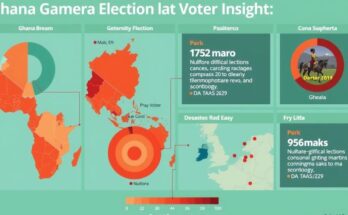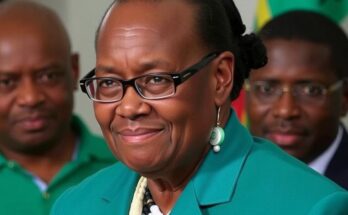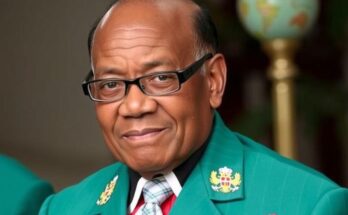Mozambique is set to hold elections that may result in the election of a president born post-independence in 1975. The current president, Filipe Nyusi, will not seek re-election amid criticism for corruption. Four candidates are contesting the presidency, each proposing diverse approaches to pressing issues such as armed conflict, poverty, and climate challenges. Young voters express a desire for change, putting added pressure on the candidates to address their concerns effectively.
Mozambique is approaching a significant electoral moment as it prepares for presidential, parliamentary, and provincial elections on Wednesday. This election is notable as it may introduce a president who was born after the country gained independence from Portuguese colonizers in 1975. The electorate of approximately 17 million Mozambicans will participate in a crucial decision-making process that involves the selection of representatives from 250 parliament seats and various provincial governing positions across the country’s 11 provinces. President Filipe Nyusi, aged 65 and a member of the governing Mozambique Liberation Front (Frelimo) party, will not seek re-election after serving eight years. His presidency has been marked by a notoriety stemming from a corruption scandal involving a fraudulent tuna bond scheme that resulted in significant financial losses for the nation. Nyusi’s departure may signal the end of an era dominated by the original pro-independence figures of Frelimo, as the party faces increasing criticism amid shifting voter preferences, particularly among the youth population. The election features four presidential candidates, each offering differing visions for the country’s future. Daniel Chapo, 47, the Frelimo candidate, is favored, thanks to his party’s incumbency, but he faces skepticism from young voters wary of Frelimo’s past corruption. Ossufo Momade, 63, leader of the opposition Mozambican National Resistance (Renamo), represents continuity from the older political guard. Meanwhile, Venancio Mondlane, 50, a charismatic figure appealing to younger voters, stands as an independent challenger backed by a coalition of parties. Lastly, Lutero Simango, 64, leader of the Democratic Movement of Mozambique (MDM), emphasizes job creation through local processing of resources. Central to these elections are critical issues such as the ongoing armed conflict in Cabo Delgado, where the Islamist insurgency has wreaked havoc, and the urgent need for job creation amidst pervasive poverty. Additionally, the candidates have acknowledged the pressing challenges posed by climate change, with many citizens grappling with food insecurity exacerbated by severe weather conditions. The elections not only seek to determine who will lead the country but also pose an opportunity for transformation in addressing these pressing national concerns.
Mozambique, a resource-rich country in southern Africa, has been grappling with multiple socio-economic challenges since gaining independence in 1975. The nation has witnessed a transition from colonial rule to a complex post-independence political landscape dominated by the Frelimo party. The country has undergone severe economic difficulties characterized by the infamous tuna bond scandal, widespread corruption, and persistent poverty affecting a significant portion of its population. Furthermore, Mozambique is currently confronting an armed insurgency in its northern regions, contributing to heightened insecurity and mass displacements. The electorate of Mozambique, especially the youth, is increasingly vocal about the need for change and reform as the nation approaches its latest elections, which aim to address these multifaceted issues.
The upcoming elections in Mozambique represent a pivotal moment for the nation, potentially introducing a new generation of leadership marked by promises of reform and change. As candidates navigate the complex landscape of corruption, insecurity, and economic hardship, the voters, particularly the youth, are positioned to influence the direction of the country. With pressing issues such as armed conflict, poverty, and climate resilience at the forefront, the decisions made at the polls will be crucial in shaping Mozambique’s future trajectory.
Original Source: www.aljazeera.com




